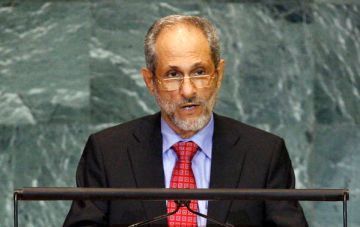INTERVIEW: Sudan’s RNP chief not optimistic about national dialogue
June 9, 2014 (KHARTOUM) – The leader of Sudan’s opposition Reform Now Party (RNP), Ghazi Salah al-Din Al-Attabani, said that the ruling National Congress Party (NCP) is not yet ready to offer the necessary compromises needed to achieve a national accord.

Attabani, who was interviewed by Sudan Tribune, underscored that dialogue is the essence of political work and its only available alternative is violence, describing differences between them and the government on dialogue requirements as significant.
The RNP leader further said that his party’s decision to suspend participation in the ongoing national dialogue process was based upon accurate estimates.
Last week, the RNP announced its intention to suspend its participation in the ongoing national dialogue process in response to what it described as a series of setbacks to political freedoms in the country.
“I am no longer optimistic about the outcome of the national dialogue. I don’t think that any kind of serious dialogue can take place given the significant difference [between us and the government] in the definition of dialogue and its requirements, and in light of [the government’s] lack of commitment to its needs. I believe that a new thesis of dialogue must replace the current one”, he said.
Attabani added that they respect the decision of the opposition Popular Congress Party (PCP) led by Hassan al-Turabi to continue participation in the dialogue process, saying the PCP has its own estimates which are based on different reading for the current political situation.
The PCP has previously rejected calls to boycott the dialogue despite acknowledging recent crackdown by the government.
Late last January, the Sudanese leader, Omer Hassan Al-Bashir announced in a televised address to the nation a four-point plan for reform “to stop the war and bring peace, free political society, fight against poverty and revitalize national identity”.
He further called for political forces and even rebel groups to lay down arms to engage in dialogue to agree on the implementation items to achieve these objectives.
In his response to a question about the extent of influence of the PCP leader on president Bashir at the moment, Attabani said:
“Bashir needs to meet several legitimacies, some of them are national and others are Islamic and this opens a window for Turabi to have an influence on him. This card could be used positively”, he said.
The RNP leader pointed that there are many rumors about the real reasons behind the arrest of the leader of the opposition National Umma Party (NUP), al-Sadiq al-Mahdi, saying the punishment he received is not commensurate with the charges filed against him by the government.
FOREIGN RELATIONS
Attabani pointed that Sudan’s foreign policy has been unsteady since independence, saying a major reason for that was the lack of clarity of the political reference of the foreign ministry.
“Other government institutions replace the foreign ministry in making foreign policy decisions. The presidency is responsible for fixing this problem”, he said.
“We are currently witnessing the worst crisis in our foreign policy; however, we will be able to overcome it if we clearly determined that our national interests and priorities of our foreign policy. We are a country surrounded by neighbors who have different interests and principles”, he added.
Attabani further said the current first priority is to unify the Sudanese people not the Islamic movements.
Attabani lost his position last year as head of the NCP parliamentary caucus after publicly declaring that Bashir is constitutionally barred from running again for the presidency.
He was also expelled from the NCP in late 2013 in the wake of a memo he drafted, along with more than two dozen party figures calling for the reversal of a decision to lift fuel subsidies and an end to the violent measures taken against demonstrators who took to the streets to protest.
Last December, he decided along with other figures to establish the RNP.
(ST)
